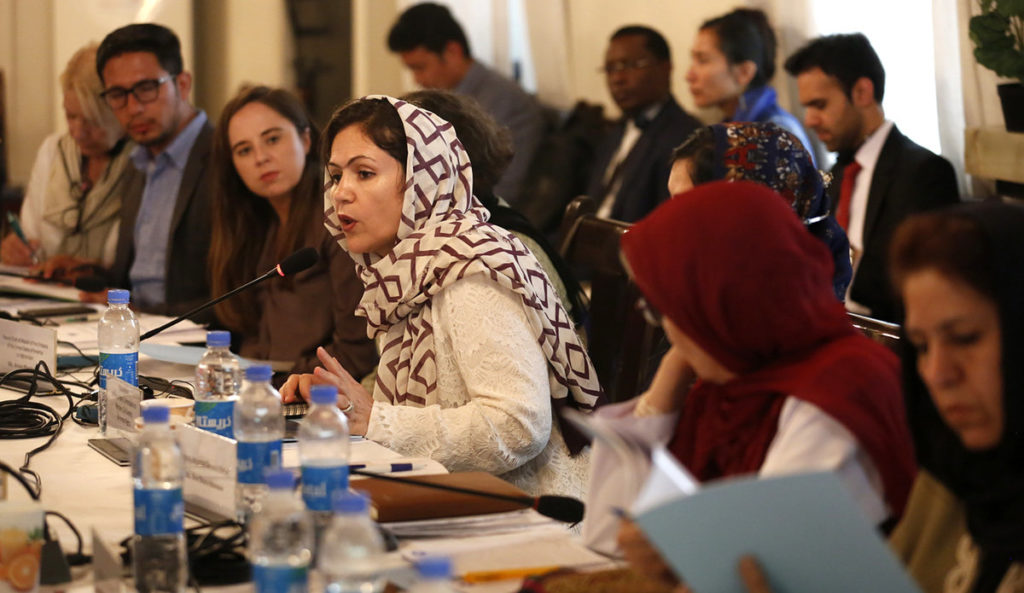
The Agency for Peacebuilding (AP) is excited to launch a call for articles for new voices and new ideas on the Women, Peace and Security (WPS) Agenda.
The call is part of the project “Enhancing Women’s Participation in Peace and Security (WEPPS)”, which AP is implementing with the ERIS (Emerging Research in International Security) group of Scuola Superiore Sant’Anna in Pisa, Italy. The goal of the WEPPS project is to promote the effective and transformative participation of women in conflict prevention, mitigation and resolution processes in North Africa and the Western Balkans.
In light of the twentieth Anniversary of UN Security Council Resolution (UNSCR) 1325 on Women, Peace and Security, the call for articles aims to facilitate critical analysis and exchange among experts willing to share their ideas, experiences and lessons learned concerning the implementation of the Women, Peace and Security Agenda.
In practice, we are interested in gathering first-hand insights from practitioners and researchers working in the field of Women, Peace and Security in the Middle East and North Africa (MENA) and the Western Balkans. The articles will be published on AP’s website and disseminated through online channels and specialized networks. Articles will thus be available to an international audience of peacebuilding and international development specialists. They will also help us to design a series of policy dialogues and trainings which are part of the WEPPS project.
IF YOU ARE INTERESTED IN SUBMITTING AN ARTICLE, PLEASE READ THROUGH THE FOLLOWING INSTRUCTIONS.
INTRODUCTION
In 2020 the world celebrates the twentieth anniversary of the adoption of UNSCR 1325 on Women, Peace and Security. This event has marked, in many ways, the formal launch of the Women, Peace and Security
Agenda (WPS), where UNSCR 1325 (and later resolutions on the same topic) has become a key tool to strengthen the effectiveness of national and international efforts to promote the participation of women in conflict prevention and resolution efforts.
The support of more and more governments and international organisations has made it possible to mobilise and activate many actors, to gain considerable experience, and to formalise many of the commitments set out in the text of UNSCR 1325 itself. This is visible, for example, in the the adoption of National Action Plans (NAPs) by over 80 states, which has effectively allowed the ‘nationalisation’ of the WPS Agenda, whereby the objectives of UNSCR 1325 have been adapted to the different national contexts. NAPs have also created the basis for a system of exchange of experiences and lessons learned with the potential to strengthen the global implementation of the WPS Agenda.
Progress, however, has not been without challenges. For example, it is sometimes thought that UNSCR 1325 only concerns countries in conflict or post-conflict, but it would be a mistake to limit its implementation to countries in open conflict, ignoring other factors that marginalize women’s voices. Moreover, women’s participation in peace and security is often perceived primarily as a problem for women, rather than a problem about the disparities between different gender groups (men and women, but also older and younger generations). Overall, the implementation of the WPS Agenda has not been consistently effective, with women being still excluded from decision-making processes, locally, nationally and internationally.
SCOPE OF ARTICLES
We are looking for articles that analyze how the WPS Agenda has been discussed, interpreted, adapted and promoted in two regions, the Middle East and North Africa (MENA) and Western Balkans. Specifically, we are interested in contributions focusing on present or past efforts to operationalize UNSCR 1325, including through the adoption and implementation of national action plans (NAPs). We also aim to give space to new voices, mainly young researchers and practitioners focusing on how the implementation of the WPS Agenda has fared in the last 20 years, and how it could do better in the future.
Articles should try to focus on one or more of the following themes:
- National Action Plans (NAPs) on Resolution 1325: Did civil society and institutions cooperate in defining and implementing NAPs? Were women coming from civil society included in the agenda-setting? How so, and what effects did this have on the content of the NAPs?
- Inclusion and participation: Which stakeholders were involved?Were there any strategies to involve marginalised voices? And what about new voices, including young women? Was there any tension between inclusion in quantitative terms and qualitative participation? Did NAPs empower women peacebuilders, and, if so, how?
- Social acceptance: Were the efforts to promote the WPS Agenda socially accepted? Were they perceived as top-down or bottom-up? What was the effect on other gender groups (including men)? Did the implementation of the WPS Agenda address or influence power dynamics?
- Lessons learned: What does experience say about the specific challenges to women’s participation? What might be the lessons learned from this experience? What factors contribute to success in implementing the WPS Agenda?
ELIGIBILITY CRITERIA
- The call is open to all researchers, practitioners, activists and experts working on the WPS Agenda. Representatives from civil society organizations (large, small or grassroots), institutions (local, national or international) or informal groups, researchers (including PhD and MA students) or evaluators, activists or advocates are all encouraged to submit their article.
- Articles should focus on efforts, initiatives, or projects at whatever implementation stage related to the field of Women, Peace and Security, UNSCR 1325 (and later resolutions) and National Action Plans (NAPs).
- The articles should focus on the regions targeted by the WEPPS project. For MENA, eligible countries include: Algeria, Egypt, Israel, Jordan, Lebanon, Libya, Morocco, the Occupied Palestinian Territories, Syria, Tunisia, and Turkey. For the Western Balkans, eligible countries are: Albania, Bosnia-Herzegovina, Kosovo, former Yugoslav Republic of Macedonia, Montenegro and Serbia.
- We are interested in articles that discuss single-country, multi-country or regional efforts. In case of articles focusing on more than one country, a comparative perspective will be appreciated.
- We strongly encourage the submission of articles by authors coming from the above-mentioned countries. However we appreciate the submission by any author regardless of nationality.
- Lastly, we are looking for original content only. Articles can focus on completed or ongoing initiatives, but they cannot have been previously published.
DRAFT GUIDELINES
- The articles should be written in English and in an accessible style, avoiding too much technical jargon (including acronyms): the audience will be made up of people familiar with peace and security issues, but not necessarily with the author’s specific context and approach.
- The title should reflect the content of the article.
- Articles should have a clear structure and logic. This could vary, but one example could be: 1) introduction to the article’s themes and focus, 2) background to the context, 3) a description of the efforts, experience or project, 4) a critical analysis of the achievements or the evidence of success, 5) conclusion explaining why this should be important to others, lessons learned and/or recommendations.
- Articles should be between 1000 and 1500 words in length, and should represent a final draft. Incomplete articles or abstracts will not be accepted.
- If you can, insert hyperlinks to other articles or papers you are citing, or to the websites of organizations whose work you are mentioning or describing.
- If you would like to see examples of articles, follow this ink.
- Articles can be shared in any format at this stage (MS Word, Google document, email text, PDF, etc).
SUBMISSION GUIDELINES
Articles should be submitted to AP’s WEPPS Editorial Team using the following email address: communications@peaceagency.org.
In the subject line please write: ARTICLE WEPPS + [YOUR NAME AND SURNAME]
Authors submitting their article will be asked to include in the body of the email the following information:
- Name and surname.
- Contact information (email and telephone number and Twitter handle and Linkedin profile, if available).
- Organisation or affiliation (if any) or field of study.
THE DEADLINE FOR SUBMITTING ARTICLES IS APRIL 28, 2020.
Selected articles will be published on our website starting from the second half of April.
The selection of articles will be the sole responsibility of the Agency for Peacebuilding, which will assess submitted contributions based on relevance, content and quality. All authors will be notified about the results of the selection process. Decisions, however, will be unappealable.
Authors of chosen articles will receive a one-time compensation of EUR 120. Publishing rights will be jointly held by AP and the authors; the latter will be credited in all communication materials to be published by AP.
For any questions, please write to communications@peaceagency.org.






























